
| WWT Shows | CLICK TO: Join and Support Internet Horology Club 185™ | IHC185™ Forums |

|
• Check Out Our... • • TWO Book Offer! • |
Welcome Aboard IHC185™  Internet Horology Club 185
Internet Horology Club 185  IHC185™ Discussion Site Main Page
IHC185™ Discussion Site Main Page  Horological Discussions, Questions and Answers
Horological Discussions, Questions and Answers  Pocket Watch Discussions
Pocket Watch Discussions  Why are Moorhouse dials special?????
Why are Moorhouse dials special?????
 Internet Horology Club 185
Internet Horology Club 185  IHC185™ Discussion Site Main Page
IHC185™ Discussion Site Main Page  Horological Discussions, Questions and Answers
Horological Discussions, Questions and Answers  Pocket Watch Discussions
Pocket Watch Discussions  Why are Moorhouse dials special?????
Why are Moorhouse dials special?????Go  | New Topic  | Find-Or-Search  | Notify  | Tools  | Reply to Post  |  |
| IHC Member 179 E. Howard Expert |
It seems like the interest in Joshia Moorhouse dials keeps growing, I continue to receive numerous requests from people asking, is this dial a Moorhouse dial? or, what makes a Moorhouse dial special? Here is an extreme close-up of a non Moorhouse Howard followed by a very nice Moorhouse dial close-up. It's pretty obvious what makes the master dial painter so special don't you think? Harold 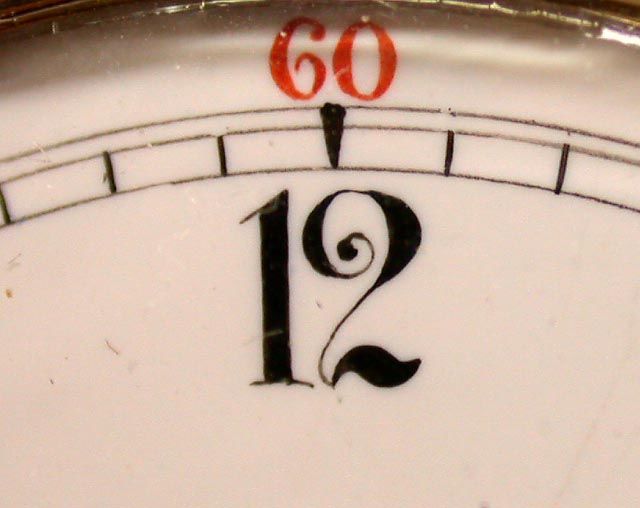 | ||
|
| IHC Member 179 E. Howard Expert |
And here is the real Moorhouse talent showing.... 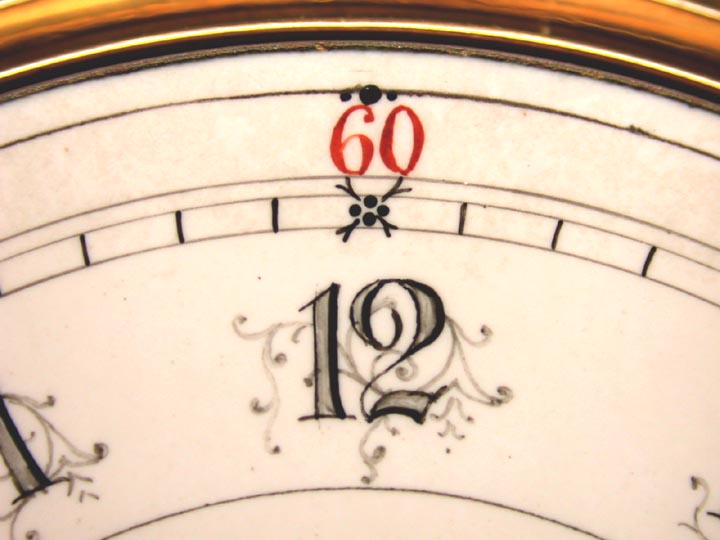 | |||
|
Simply.. they are ART Thanks Harold! | ||||
|
Now let's see the entire dial!!! Pleeeeease! Sheila | ||||
|
| IHC Member 179 E. Howard Expert |
Ok, here it is Sheila, 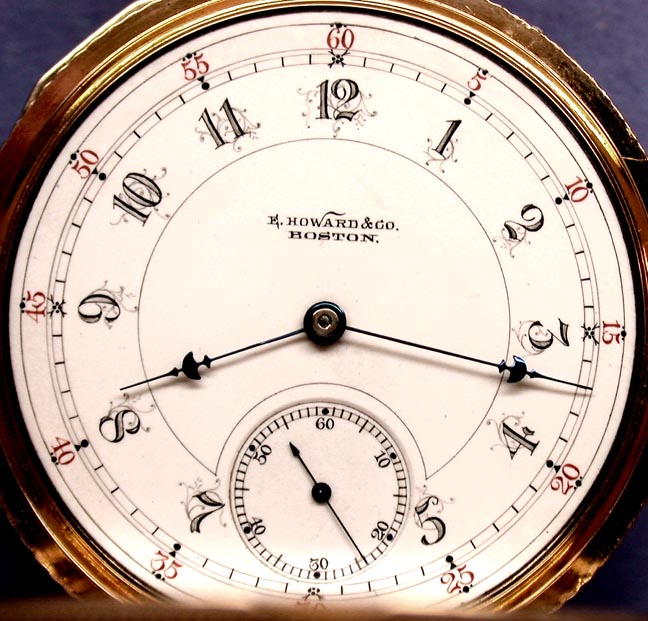 | |||
|
| IHC Life Member |
This is very nice. I couldn't imagine someone taking the time to do this today Larry | |||
|
| E. Howard Expert |
Hello All, The August 1993 BULLETIN has a 22 page article on Howard dials, including a long section on Moorhouse. Harold's dial, one of my "alumni," is Figure 26 therein. Cheers. | |||
|
I've always found this to be one of the most informative sites around. Everuthing is scrupulously photographed and there's a wealth of documentation--including original copies of the documents themselves. I apologize for sounding so silly, but isn't truth a defense? http://www.awco.org/Seminar200...dTheme/HowardCat.htm Jessica | ||||
|
| E. Howard Expert |
I have seen a few of these Ball Hampden dials over the years, and I strongly suspect that they were conscious, intentional copies of Moorhouse' style made by Hampden's own dial painters. I believe this for several reasons: 1) There was no known business relationship between either E. Howard & Co. or Moorhouse personally in the period when those dials were made (which incidentally, predates the runs of Howard private label movements made for Ball). 2) Moorhouse often (not always, but often) signed his work on the back's of the dials he painted. But none of the Moorhouse style Ball-Hampden dials I have seen or heard of carry Moorhouse's signature. 3) Moorehouse's work shows great individual character and variation, whereas all the Ball-Hampden Moorhouse dials I have seen are essentially identical. This uniformity is uncharacteristic of Moorhouse's work (though exact signed duplicates do exist). 4) Some of these intentional copies (my opinion of what they are) appear to lack the skilled grace of the master's hand. They are a bit crude and blocky by comparison. None of these clues are definitive in and of themselves, but taken together they lead to the conclusion that the "Moorhouse-style" Ball-Hampden dials likely are imitations. After all, imitation is, as everyone knows, the most sincere form of flattery. 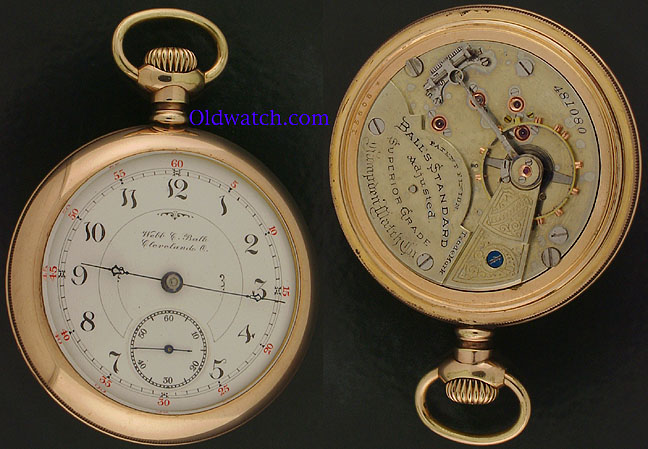 | |||
|
Interesting. There's a long tradition of imitators in art history, not to mention people who studied with the master and learned his style from "finishing" the more repetitive parts of the paintings (the folds of dresses, collars, etc) to working even on central images if the master was off. Some of these painters were respected in their own right as highly competent or talented. That's lead to all the disputes about whether a painting is genuine, or which part the master painted himself, and why so many paintings are called "workshop" or "school" of... The dial I saw is certain quite beautiful--even if simple--particularly compared to most Ball dials. Of course, the originator of a style or technique is the true master. Jessica | ||||
|
| E. Howard Expert |
In my 1993 article I did lean towards the view that the Ball-Hampden dials may have been MH products. At that time, second hand evidence also was presented to me that MH may have worked (freelanced?) for some other companies as well. This seemed to make an early MH connection with Hampden more plausible. However, since that time I have come to regard that second hand information to be faulty and the source to be unreliable. I guess that's a lesson learned. My opinion of who likely painted the Ball-Hampden dials has thus changed. | |||
|
I noticed while looking through the Hampden book (I think) another dial that seemed to have been painted by the same person, and while the "Ball and Co." part of the dial was almost identical to the "wavy" line one, the numbers were, as you mentioned, very blocky. So it would a raise the question in my mind as to either the stylistic unity of Moorhouse's own style, or the identity of the painter. Jessica | ||||
|
| E. Howard Expert |
The really fascinating thing about it is that it was made for a Waltham Model 1883 movement and the reverse is not only signed and dated, it also includes the time of day - "7:30 PM" !!! The speculation is that this may have been a moonlight product not commisioned or even authorized by Moorhouse's employer, and the time of day was included to document that it was done on Moorhouse's own time. I have seen quite a few other signed and dated Moorhouse dials, but no other that indicated the time of day. | |||
|
Thank you so much for showing the dial for me, and to everyone else for sharing so much more. These dials are gorgeous! Sheila | ||||
|
Not all of Moorhouse's dials exhibit such elegance and artistry as those shown in the messages above. Here is a very "plane Jane" dial that I recently purchased on eBay. Quite a find! | ||||
|
Hans I converted the photo from a TIFF image to a JPG image. 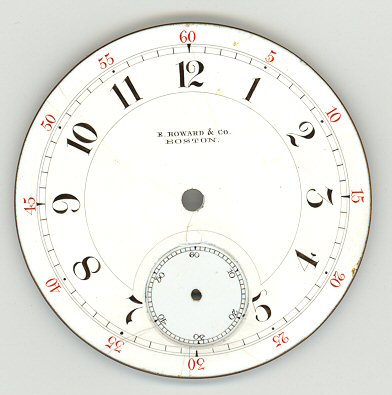 | ||||
|
Thanks for the advice. I thought that it might be the .tif file extension. Anyway, here is the interesting conclusion to my previous post: This is a most interesting dial. First, it has four feet, two of which are threaded. 11.5' - threaded 24.5' - solid 35.5' - threaded 52.5' - solid This must mean that this dial is a universal replacement dial not made for any specific production model but rather to fit any of the N-size movements of the early and late Series IV, Series VII, Series VIII (with one foot cut off), and Series IX. I have another unsigned dial with the usual Moorhouse characteristics at the quarter hour positions that also has two threaded feet and one solid foot. It came from a Series IV movement. So, it appears that these dials are aftermarket products when customers wanted to possibly upgrade their watches from Roman to Arabic numerals. I would like to hear other comments and ideas regarding this dial and others like it. Hans 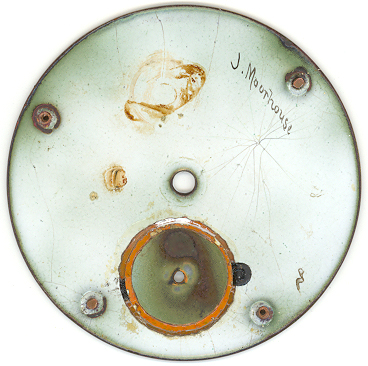 | ||||
|
| E. Howard Expert |
I have seen entirely too many signed Moorhouse threaded leg Model 1871 ("Series IV") dials to believe that they were all aftermarket replacements. A much more likely explanation is that quite a few earlier movements sat around for a number of years prior to being sold in a retail shop. There would have been no question of obsolesecence by 1886, as the only consistent difference between the N Size hunting case "Series VII" movements Howard was making in that year and the older "Series IV" movements is the serial number. A retail customer would have noticed no difference. Furthermore, Howard's threaded dial legs are thicker than the standard ones, and would not have fit into the pillar plate of any but a Series IV movement. Hence, this dial, if a replacement, would not have been a "universal" replacement. Neither is a completely unembellished signed Moorhouse dial so unique. Several others are known to exist. | |||
|
Here is a dial that is unsigned on the back. Could this be a Moorhouse? Brian C. 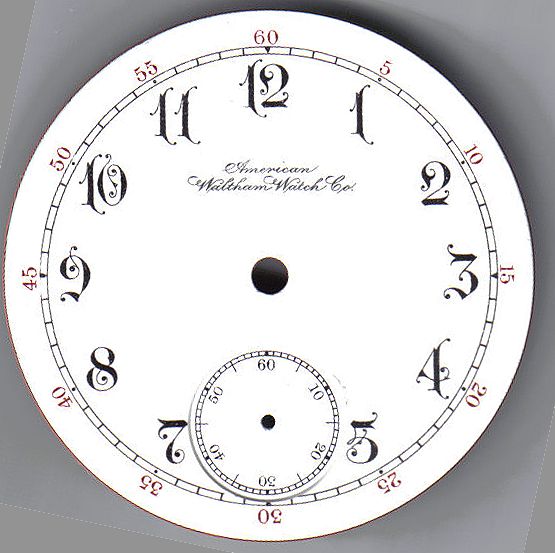 | ||||
|
| E. Howard Expert |
Hi Brian, Since totally unembellished dials are sometimes Moorhouse dials, this dial could be, too. However, the more relevant question is: Is there reason to think it is? The answer is: not especially. True, many signed Moorhouse dials feature embellished numerals similar, though not exactly identical to those on this dial, but so do many painted by other workmen. Unless such embellishments appear together with one of Moorhouse's more distinctive artistic signatures, such as his unique line decorations at the quarters of the minute track, or skeletonized, filled numerals, or grey and red lacework enhancements, or his characteristic finials or cartouches, "fancy" numerals in and of themselves don't really tell one that much. What can the dial feet tell you? If this dial is for a Model 1888 Waltham, for example, we can be reasonably sure that it isn't a Moorhouse creation as he was at Howard by then. (The 1883 dial shown earlier in this string is very likely the only post-1886 Waltham dial Moorhouse made until he returned to Waltham some time after 1896.) | |||
|
Hi Clint, Thanks for the info. The dial fits an 1883 model. I'm from the school if it's not signed, it's not a Moorhouse or an O'Hara dial. Just wanted another opinion. Brian C. | ||||
|
| Powered by Social Strata |
| Your request is being processed... |
|
Welcome Aboard IHC185™  Internet Horology Club 185
Internet Horology Club 185  IHC185™ Discussion Site Main Page
IHC185™ Discussion Site Main Page  Horological Discussions, Questions and Answers
Horological Discussions, Questions and Answers  Pocket Watch Discussions
Pocket Watch Discussions  Why are Moorhouse dials special?????
Why are Moorhouse dials special?????
 Internet Horology Club 185
Internet Horology Club 185  IHC185™ Discussion Site Main Page
IHC185™ Discussion Site Main Page  Horological Discussions, Questions and Answers
Horological Discussions, Questions and Answers  Pocket Watch Discussions
Pocket Watch Discussions  Why are Moorhouse dials special?????
Why are Moorhouse dials special?????©2002-2025 Internet Horology Club 185™ - Lindell V. Riddle President - All Rights Reserved Worldwide

